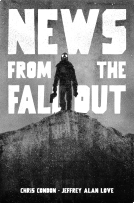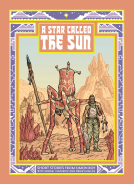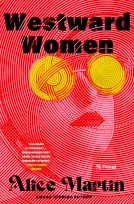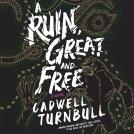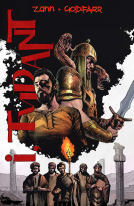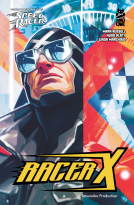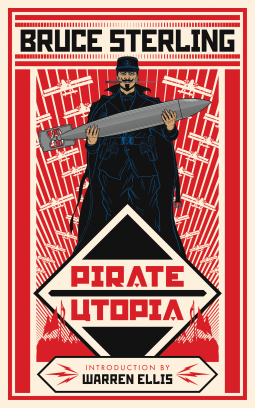
Pirate Utopia
by Bruce Sterling
This title was previously available on NetGalley and is now archived.
Send NetGalley books directly to your Kindle or Kindle app
1
To read on a Kindle or Kindle app, please add kindle@netgalley.com as an approved email address to receive files in your Amazon account. Click here for step-by-step instructions.
2
Also find your Kindle email address within your Amazon account, and enter it here.
Pub Date Nov 15 2016 | Archive Date May 02 2017
Description
Who are these bold rebels pillaging their European neighbors in the name of revolution? The Futurists! Utopian pirate warriors of the diminutive Regency of Carnaro, scourge of the Adriatic Sea. Mortal enemies of communists, capitalists, and even fascists (to whom they are not entirely unsympathetic).
The ambitious Soldier-Citizens of Carnaro are led by a brilliant and passionate coterie of the perhaps insane. Lorenzo Secondari, World War I veteran, engineering genius, and leader of Croatian raiders. Frau Piffer, Syndicalist manufacturer of torpedos at a factory run by and for women. The Ace of Hearts, a dashing Milanese aristocrat, spymaster, and tactical savant. And the Prophet, a seductive warrior-poet who leads via free love and military ruthlessness.
Fresh off of a worldwide demonstration of their might, can the Futurists engage the aid of sinister American traitors and establish global domination?
A Note From the Publisher
Advance Praise
Praise for Pirate Utopia
A Kirkus 9 Great Books to Round Out 2016
An io9 16 Must-Read Science Fiction and Fantasy Books for November
A Speculition Best of 2016
A Village Voice Must-Read
“This small but exquisite volume packs a lot of power for
its size. Lovers of artful books won’t want to miss it.”
—Karen Haber, Locus
[STARRED REVIEW] “Cyberpunk progenitor Sterling’s alternate history novella is bizarre, chock-full of famous people in improbable situations, and wildly entertaining, even when the world-building seems to go a little off the rails. Lorenzo Secondari, a veteran of the recently ended Great War and forever changed by it, is the head engineer of the titular utopia, the Italian free state of Fiume. He and his compatriots build flying boats and fight communism while dealing with American secret agents, including Harry Houdini and Howard Lovecraft (who’s now working as Houdini’s publicity agent after going into advertising). Hitler died saving another man’s life in a bar fight, Wilson was poisoned, and Mussolini’s been disabled by a pair of bullets aimed “where a man least likes to be shot,” so the Europe in which Secondari is attempting to create his radio-controlled airborne torpedoes and other gizmos is already massively different from ours. An introduction by Warren Ellis and an interview with Sterling sandwich the novel, both bearing an air of false gravitas, but the actual story is wacky and fun what-if-ing at its finest.”
—Publishers Weekly
[STARRED REVIEW] “Noted sci-fi maven and futurologist Sterling (Love Is Strange, 2012, etc.) takes a side turn in the slipstream in this offbeat, sometimes-puzzling work of dieselpunk-y alternative history. Resident in Turin, hometown of Calvino, for a dozen years, Sterling has long been experimenting with what the Italians call fantascienza, a mashup of history and speculation that’s not quite science fiction but is kin to it. Take, for example, the fact that Harry Houdini once worked for the Secret Service, add to it the fact that H.P. Lovecraft once worked for Houdini, and ecco: why not posit Lovecraft as a particularly American kind of spook, “not that old-fashioned, cloak-and-dagger, European style of spy,” who trundles out to Fiume to see what’s what in the birthplace of Italian futurism-turned-fascism? Lovecraft is just one of the historical figures who flits across Sterling’s pages, which bear suitably futuristic artwork, quite wonderful, by British illustrator John Coulthart. Among the others are Woodrow Wilson and Adolf Hitler, to say nothing of Gabriele D’Annunzio and Benito Mussolini. “Seen from upstream, most previous times seem mad,” notes graphic novelist Warren Ellis in a brief introduction, but the Futurist project seems particularly nutty from this distance; personified by Lorenzo Secondari, a veteran of World War I who leads the outlaw coalition called the Strike of the Hand Committee in the “pirate utopia” of the soi disant Republic of Carnaro, its first task is to build some torpedoes and then turn them into “radio-controlled, airborne Futurist torpedoes,” not the easiest thing considering the technological limitations of the time. A leader of the “Desperates,” who “came from anywhere where life was hard, but honor was still bright,” Secondari and The Prophet—D’Annunzio, that is—recognize no such limitations and discard anything that doesn’t push toward the future. So why not a flying pontoon boat with which to sail off to Chicago, and why not a partnership with Houdini to combat world communism? A kind of Ragtime for our time: provocative, exotic, and very entertaining.”
—Kirkus, starred review
“A fantastic, comical, alternate historical dieselpunk affair . . . filled with astonishing characters, fine dialogue, and an abundance of ideas and is packaged with John Coulthart’s cool Futurist-Constructivist-inspired graphics, an introduction by graphic novelist Warren Ellis, and an interview with the author.”
—Booklist
“VERDICT: The fused edge between alternative history and historical fact elevates this shorter work by cyberpunk pioneer Sterling (Love Is Strange).”
—Library Journal
“Fritz Lang directing Buckaroo Banzai.”
—Locus
“Pirate Utopia is Sterling in serious entertainment mode, mashing up the real and fictional with Robert Coover-like intensity and geeky joy.”
—Austin Statesman
“Pirate Utopia features all the best hallmarks of veteran Bruce Sterling’s style—insane gadgets, deep world-building, a ridiculous cast of colorful characters, extrapolation from existing history, and a warped sense of humor.”
—Barnes & Noble Sci-Fi & Fantasy Blog
“Quite brilliant.”
—Michael Swanwick, author of The Dragons of Babel
“Between 1920 and 1924, the Free State of Fiume was a real-world "pirate utopia," an ungoverned place of blazing futurism, military triumphalism, transgression, sex, art, dada, and high weirdness. In Bruce Sterling's equally blazing dieselpunk novella Pirate Utopia, the author turns the same wry and gimlet eye that found the keen edges for steampunk's seminal The Difference Engine to the strange business of futurism.”
—Cory Doctorow, Boingboing
“Pirate Utopia is a rollicking, full-bodied, intelligent satire of a country that might have been a world player, had not events conspired against it in real life.”
—Strange Alliances
“An alternate history clusterfuck of brilliant, whacky world-building and hilarious, bizarre characters.”
—LitReactor
“If you’re looking for something off the beaten track, check
out this provocative venture by a writer who isn’t afraid to push the envelope.”
—Asimov’s SF
“In Pirate Utopia, Bruce Sterling has brought off a minor miracle, an allegory on our present geopolitical danza di morte that doesn’t feel remotely allegorical but instead stays true to its dieselpunk setting: a skewed Fiume crawling with Italian Futurists, Balkan anarcho-syndicalists, and demented Gernsbackian visionaries of all stripes and genders, their adventures documented through hilarious deadpan prose and John Coulthart’s dazzling graphics.”
—James Morrow, author of The Philosopher’s Apprentice and The Madonna and the Starship
“A wild satire about serious issues. Sterling's wonder-romp is perfectly matched by Coulthart's superb designs. The best of their brilliant generation, Sterling and his collaborator have produced a book to treasure. Bravo!”
—Michael Moorcock, author of the Elric of Melniboné series and The Whispering Swarm
“Spiky, provocative, drenched in his trademark wit, Sterling delivers us a brilliant and surprising jolt of vividly rendered counter-factualism.”
—Alastair Reynolds, author of Revenger and the Revelation Space series
“Bruce Sterling maintains that J. G. Ballard was the most accurate and brilliant prophet ever to arise from the ranks of science fiction. I have to disagree, and hereby nominate Sterling himself for that honor. Although his newest, Pirate Utopia, a rigorously gonzo counterfactual, is not one of the thickly detailed futures he has often previously imagined, it nonetheless captures the feelings and vectors and strange attractors of the present day in a most startling and entertaining fashion. As politics, culture and individual lifestyles warp and mutate and shatter around us, dynamic individuals learn how to assemble new and more satisfying outlaw lives from the shards. Sterling's intimate acquaintance with modern Europe powers this compact powerhouse of a book, and his insights into the human soul enliven the vivid, heterogeneous cast. Using the powers consecrated by my ethnicity, I hereby dub Sterling an honorary Italian, and a worthy successor to our Futurist heritage!”
—Paul Di Filippo, author of A Palazzo in the Stars
“A splendidly illustrated Futurist romp, reminiscent of the comedic elements in Pynchon’s Gravity's Rainbow, Pirate Utopia riffs on real, recondite modern history to truly bizarre effect.”
—Gwyneth Jones, author of Life and The Grasshopper’s Child
“I don't know why a little weirdo like me is blurbing a demigod like Bruce Sterling, but listen, little weirdos: the Pirate Utopia is calling for you! Build the future before it gets built for you; read this book.”
—Nick Mamatas, author of Sensation and I Am Providence
“Imagine if Hunter S. Thompson traveled in time to the Great War in order to write The Futurist Manifesto and you'd come a little closer to envisioning the surreal, madcap—and yet almost entirely factual! —adventure that is Bruce Sterling's Pirate Utopia. It is sly, smart, and subversive—and also very, very funny.”
—Lavie Tidhar, author of Central Station and A Man Lies Dreaming
“Satirically glamorous, Bruce Sterling's Pirate Utopia captures a comically refined view of the proceedings as only Bruce Sterling can…delightful...engaging...a visual treat.”
—Speculiction
“Pirate Utopia may seem to be about an ancient and almost forgotten struggle between Italy and Yugoslavia, but its themes are as relevant as this year's presidential politics.”
—Locus
“Pirate Utopia’s a short, fun read that doesn’t alternate between stark and wacky but manages to hold their continuing tension in exquisite and exacting fashion. Highly recommended.”
—Neuro Vagrant
“With an introduction by Warren Ellis, Rick Klaw’s interview with the author, and John Coulthart’s awe-inspiring illustrations based on the work of designer and Futurist manifesto co-author Fortunato Depero, Pirate Utopia is an artistic triumph.”
—See the Elephant
Praise for Bruce Sterling
"He understands technology’s present and future better than anyone in the field."
—Cory Doctorow, author of Little Brother
"And if you miss the sensation of having science fiction stretch your brainmeat a bit, of those powerful and irreversible up-endings of the way you see certain things, and you're not aware of Bruce Sterling? Go find him.”
—Strange Horizons
“[H]is highly caffeinated energy is hard to resist.”
—Publishers Weekly
“Bruce Sterling has managed to pen a delivery vessel for a futuristic, anarchistic dystopian idea of human potential."
—New York Journal of Books
"Science fiction that makes the rest of near-future SF look toylike by comparison. It's as if Sterling is the only writer paying attention to what's happening in the real world."
—Locus
"Love him or hate him, Bruce Sterling always has something important to say. . . .”
—Booksmark Magazine
"Bruce Sterling remains one of the key SF writers"
—SFRevu
Praise for the works of Bruce Sterling
"Breathtaking.”
—New York Times Book Review on The Difference Engine (with William Gibson)
"Climb aboard Sterling’s speculative roller coaster; a dazzling, eye opening ride through the modern world....”
—Village Voice on Mirrorshades: The Cyberpunk Anthology
"A haunting and lyrical triumph"
—Time, on Holy Fire
“A comedic thriller for the Homeland Security era.”
—Entertainment Weekly on The Zenith Angle
"An arresting slice of future history”
—Kirkus on Schismatrix Plus
"A tour de force"
—Benjamin Rosenbaum, author of The Ant King and Other Stories on The Caryatids
"A gem.”
—Chicago Sun-Times on Zeitgeist
"Written with humor and intelligence, this book is highly recommended.”
—Library Journal
Marketing Plan
-Consumer and trade advertising
-Regional and national author appearances
-Promotion at major genre conventions
-Planned book giveaways online including NetGalley and Goodreads
-Promotion on author's website (http://brucesterling.tumblr.com) and social media: Twitter (@bruces, 33K followers)
Available Editions
| EDITION | Other Format |
| ISBN | 9781616962364 |
| PRICE | $19.95 (USD) |
Average rating from 35 members
Featured Reviews
 Brad H, Reviewer
Brad H, Reviewer
Pirate Utopia by Bruce Sterling
My rating: 5 of 5 stars
Thanks to Netgalley for the ARC!
Italy! 1920's. A little town called Fiume that later becomes known as the modern Rijeka had had it's world turned upside down when a bunch of rag-tag ill-provisioned warriors took it over and declared themselves an Anarcho-Syndicalist Union, full of free love, art, poetry, high-ideals, and most of all, Rebellion. They even called themselves Pirates!
Now what if the whole thing hadn't imploded after 15 months, and instead had gone on to arm themselves successfully and innovate as they had dreamed, to become a real haven for free thinkers and equality of the sexes, ignoring the cries of the rich and the powerful as they gleefully took over all the manufacturing plants in a communist-like frenzy, but stopping there only to kick out all the actual communists?
They live by theft and live by their strength, fascists in fact, but not in spirit, for everyone is truly equal here.
Wow. As an SF novel, it's really quite gorgeous. I've been getting tired of all those overdone WWII alternate histories. This one is a beautiful strike in another direction, and it's humorous and it's scary and it pushes all the right buttons for me.
And it's also pulp in all the grand ways, too. :) Mussilini got his dick shot off while working as an editor, Hitler got shot and killed taking a bullet for a friend. There's even Houdini, the Spy, Lovecraft his employee, and also Robert E Howard working alongside them. I was hoping to see Clarke Ashton Smith among them, but alas, no. :)
I haven't been so delighted by such a strange book just tickling my sense of wonder in such a way as this. Bruce Sterling has gotten really interesting.
He's been living in Europe for the last decade, learning so much about these places, and also as an American Cyberpunk author now writing Dieselpunk, I have to say that he's pushing the envelope again. :) In a really awesome way. :)
Bravo!
In the uncertainty following World War I, a tiny Italian town gets handed off to newly-created Yugoslavia and, after a certain amount of wrangling, goes through a brief, joyfully chaotic period of being its own state, run by a host of colorful characters. This part really happened, although not in quite the way Sterling portrays it, and he has changed the names. In this workers’ paradise, Futurists and a host of other –ists take over not only the town/national government but its torpedo factory. I was only vaguely familiar with Futurism, but when a woman character, upon hearing the accusation of being the mistress of the Pirate Engineer, announces “Our relationship is chaste and revolutionary!” I howled with laughter. And the book only got better from there, treading with consummate skill the lines between political farce and heart-breaking almost-reality. Various actual historical personages make guest appearances. My favorite was H. P. Lovecraft (now happily married and less terminally morose but still sounding very much like his writing) as Harry Houdini’s PR man, assisted by Robert E. Howard (creator of “Conan”). I never felt lost, but when I finished, I wanted to find out more about the various philosophical and social experiments of the time, a sure sign that my curiosity had been thoroughly engaged. This is an intellectually gorgeous book, one that challenged me without ever making me feel out in the cold. It did not surprise me to see a list of starred reviews: you can add mine!
 Daniele F, Reviewer
Daniele F, Reviewer
[Note: I received this book for free from the publisher in exchange for an honest review. This in no way affected my opinion of the book, or the content of my review.]
I have now read some literature from Bruce Sterling and I have to say that, whereas the preconditions were always interesting (previously read books were "The difference engine" and "Love is strange"), the result did not appeal to me particularly.
So, in the end, this is the first Sterling's book I really appreciated, maybe due to the fact that it exploits a misknown fact in the Italian XX century history (even at high school there is usually no time to go through this), i.e. the establishment of the Free State of Fiume.
Sterling mixes virtuously real and imaginary characters (and sometimes the real ones are weirder than the imaginary ones) in a novelette, which is probably more a dystopian divertissement.
However he succeed in bringing life to this set of characters, leaving altogether the reader to try to imagine how this would have gone if this was true.
Readers who liked this book also liked:
Chris Condon & Jeffrey Alan Love
Comics, Graphic Novels, Manga, Horror, Sci Fi & Fantasy
Sophie Campbell
Comics, Graphic Novels, Manga, Entertainment & Pop Culture, Sci Fi & Fantasy
Antony Johnston
General Fiction (Adult), Mystery & Thrillers, New Adult



